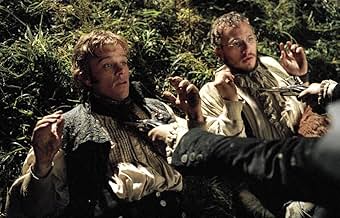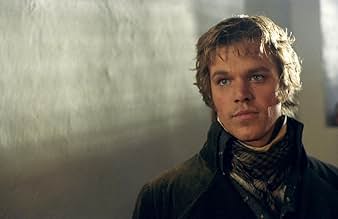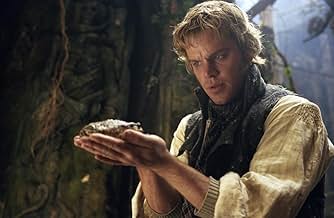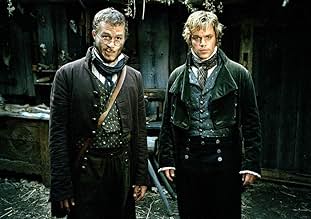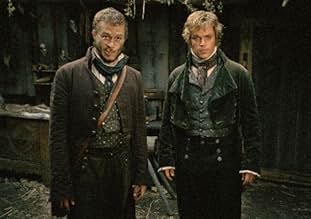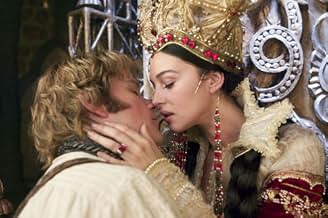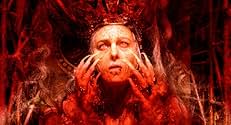Will et Jake Grimm, escrocs itinérants, se retrouvent face à face avec une malédiction de conte de fées bien réelle, qui nécessite un vrai courage au lieu de leurs habituels exorcismes de pa... Tout lireWill et Jake Grimm, escrocs itinérants, se retrouvent face à face avec une malédiction de conte de fées bien réelle, qui nécessite un vrai courage au lieu de leurs habituels exorcismes de pacotille.Will et Jake Grimm, escrocs itinérants, se retrouvent face à face avec une malédiction de conte de fées bien réelle, qui nécessite un vrai courage au lieu de leurs habituels exorcismes de pacotille.
- Prix
- 4 victoires et 5 nominations au total
- Mother Grimm
- (as Barbara Lukesova)
- Miller's Daughter
- (as Marika Prochazkova)
- Red Hooded Girl
- (as Alena Jakobova)
Histoire
Le saviez-vous
- AnecdotesMatt Damon and Heath Ledger were originally cast in opposite roles. They petitioned and switched their roles.
- GaffesDifferent characters are heard humming the famous lullaby by Johannes Brahms, who published it in 1868, many years after 1811 when action is supposed to be happening.
- Citations
Jacob Grimm: It's this way, Will!
Will Grimm: No, no, it's not, it's not. It's that way! Grandmother Toad told me!
Jacob Grimm: What?
Will Grimm: [dead serious] Trust the toad!
- Générique farfeluAfter the credits, a howling wolf can be heard over the Dimension Films tiger logo stylized to look a bit like the MGM roaring lion.
- ConnexionsFeatured in HypaSpace: Episode #4.170 (2005)
- Bandes originalesHappy Ending
Composed and Performed by Ladislav Horak, Frantisek Matijovsky, Ivo Mrazek,
Josef Vondracek and Lubos Harazin
A much better handling of the subject is the 1962 film "The Wonderful World of the Brothers Grimm," which intersperses a realistic though nonfactual account of the brothers' lives with dramatic recreations of the tales they collected. I'm not saying that Gilliam had to do a retread of the same material. I would be very happy to see a remake with a radically new approach, as long as it respects the underlying subject matter. Gilliam's film does not. Its storyline is mostly a long string of fantasy and horror clichés that remind us far more of contemporary movies than of classic fairy tales. The Big Bad Wolf, for example, has been reduced to a standard-issue wolf-man (brought to life with digital effects that are just a tad too jerky to be excused in our age of high-tech movie-making).
In this version, the brothers (Heath Ledger and Matt Damon, both inexplicably adopting English accents) are con artists who go from town to town posing as conjurers who can protect the local populace from evil spirits. A French general (Jonathan Pryce) catches on to what they're doing and forces them to work for him, on pain of death. But when they're sent to a new town, their old tricks prove useless against an age-old curse that really does haunt the woods.
The movie belongs to the old genre where famous writers become characters in their own stories. It's a genre I've never much liked, maybe because it suggests a failure to comprehend the powers of human imagination. ("No one could have made up these stories; they must have really happened!") But I have enjoyed a few films of this kind, such as the 1979 movie "Time After Time," where H.G. Wells builds a time machine and travels to the 1970s in pursuit of Jack the Ripper. This type of story has to work hard to achieve the willing suspension of disbelief. "The Brothers Grimm" fails on that front because it changes its reality too often. In an early scene, we're shown an intense battle with an awesome-looking banshee. Then the whole battle is revealed to have been staged. And then, later on, we're asked to believe that magic really does exist in this world after all. These repeated shifts in the story's reality are profoundly disorienting.
The source of disarray in the woods is an undead queen (Monica Bellucci) trying to regain her youth in an elaborate spell that will be completed once she sacrifices a series of children from the town. She resides in a tower in the woods, appearing as a skeleton on one side of a mirror and as a beautiful woman on the other. Her magical control over the woods serves as an excuse for numerous scenes of mysterious enchantment, most of which have a very tenuous connection to the central plot. The trees in the forest seem to have a life of their own, walking around when no one's looking. A mysterious creature lurks at the bottom of a well. The wolf-man is a servant of the mirror queen, using magic to ward off would-be visitors. But a coherent story never emerges from these elements. The screenplay seems to make up the rules as it goes along, inventing whatever is convenient at any given moment. Every now and then, some familiar quote is referenced--"Who is the fairest of them all?"; "What big eyes you have"; "You can't catch me, I'm the Gingerbread Man"--but always gratuitously. The movie's magical story is formless and convoluted, lacking any consistent narrative logic. It comes off as a series of elements arbitrarily glued together.
As a result, the magical sequences lack payoff. We keep waiting for something wondrous to happen, then nothing does. In one sequence, for example, two children named Hans and Greta are making their way through the woods, leaving a trail of bread crumbs in their wake. We eagerly await the children's encounter with the gingerbread house run by the cannibalistic witch, or at least something of comparable interest. But just about the only thing that happens is a mysterious sequence involving a levitating shawl. Like many other sequences in the film, this one doesn't go anywhere and has only the faintest connection with the mirror queen story.
No doubt there's an important theme at work in scenes like this. The movie is suggesting that the classic fairy tales are the result of accounts that have been embellished over time. But other writers have handled this theme much more effectively. Gregory Maguire's novel "Wicked," for example, turns "The Wizard of Oz" into a sophisticated adult fantasy with complex character motives and sly social satire. In that novel, there is a definite implication that we are being told the "real" story, and that the conventional version is the corruption. But the novel handles this conceit by expanding on the story, not degrading it. There's no point in creating a revisionist fairy tale if it's going to be less fleshed out than the original.
- kylopod
- 7 oct. 2006
- Lien permanent
Meilleurs choix
- How long is The Brothers Grimm?Propulsé par Alexa
Détails
- Date de sortie
- Pays d’origine
- Sites officiels
- Langues
- Aussi connu sous le nom de
- The Brothers Grimm
- Lieux de tournage
- sociétés de production
- Consultez plus de crédits d'entreprise sur IMDbPro
Box-office
- Budget
- 88 000 000 $ US (estimation)
- Brut – États-Unis et Canada
- 37 916 267 $ US
- Fin de semaine d'ouverture – États-Unis et Canada
- 15 093 000 $ US
- 28 août 2005
- Brut – à l'échelle mondiale
- 105 316 267 $ US
- Durée1 heure 58 minutes
- Couleur
- Mixage
- Rapport de forme
- 1.85 : 1
Contribuer à cette page



